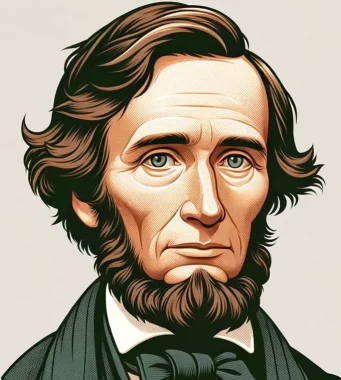
Amos Bronson Alcott
Intro
A. Bronson Alcott was a teacher, social reformer a mentor to Transcendentalism’s movement’s leading figures: Ralph Waldo Emerson, Henry David Thoreau, and Jane Addams. He was also the father of Louisa May Alcott, whose novel Little Women was based on her upbringing in his house.
Alcott’s primary work was as a teacher, not a philosopher. His close friends, including Emerson and the editor Margaret Fuller, tried to help him develop his ideas into a coherent philosophy, but Alcott’s meandering prose proved too dense even for philosophy journals. His influence was felt more through his actions than his writings.
From 1835 to 1840, Alcott operated an experimental school in Boston where he tested his egalitarian teaching philosophy with a small group of students from wealthy families. His methods were directly opposed to the top-down method embraced by most teachers in the 19th century and proved controversial. Alcott’s poor writing skills made him an ineffective advocate and he was unable to persuade his critics, so the school didn’t last long.
Bio
Bronson Alcott’s formal education lasted only four years: from age six to ten he was a student at the schoolhouse in his home town of Wolcott, Connecticut. That, and some help from his mother and uncle, was all he had to prepare him for a career as a teacher. Despite his lack of schooling, he passed the exam for a teaching certificate and at the age of 24 began a tumultuous career as an experimental educator. He took a series of teaching jobs throughout his twenties but repeatedly lost the support of supervisors and students’ families when he refused to compromise on his methods. The controversy was compounded by Alcott’s tendency to bring unorthodox religious views into his teaching, which some saw as inappropriate and even blasphemous.
His greatest professional success was the founding of Temple School, a short-lived experimental school in Boston where Alcott taught through conversation and free expression, avoiding drills and memorization. Families in Boston were slightly more tolerant of Alcott’s methods than families in other towns, but even so he was unable to keep the school running for more than a few years. Throughout the rest of his life he was periodically offered teaching positions at other schools but consistently refused to take any job that conflicted with his principles.
Alcott was also a reformer outside the classroom. He was strongly aligned with the abolitionists and opposed to American expansionism in the west. When Texas was annexed as a slave state, Alcott was so outraged by the imperialism and expansion of slavery that he refused to pay his taxes. Although the tax was later paid by his friends, the act of resistance inspired Henry David Thoreau, who would undertake a similar protest against the Mexican-American war and who ultimately wrote the book Civil Disobedience, which inspired the nonviolent resistance movements of Mahatma Gandhi and Martin Luther King, Jr.
Alcott’s Ideas
Egalitarian Teaching
Alcott saw students in terms of human potential, and argued that the teacher’s role was to help students unlock that potential. Rather than building the student into an externally-imposed model of excellence, teachers should facilitate a process of self-discovery through conversation and free expression. He threw out the grammar drills and memorization and encouraged students to express themselves through art and literature. He even went as far as to reverse the common practice of corporal punishment – not only did he refuse to strike students who misbehaved, he told the offending student to strike him. Alcott believed the shame of striking a teacher would weigh on the student’s conscience and would be a more powerful lesson than a physical slap on the knuckles.
Quotes
The true teacher defends his pupils against his own personal influence. He inspires self-trust. He guides their eyes from himself to the spirit that quickens him.
It’s a paradoxical idea that a teacher should not influence students. Isn’t teaching an act of influence by definition? Alcott, in his typically convoluted way, uses this paradox to illustrate the idea of facilitating self-discovery in students. He also hints at the spiritual side of teaching, which he took so seriously that it got him in trouble with some devout parents.
In Pop Culture
Dewey Finn, Jack Black’s character in School of Rock has a lot of Bronson Alcott in him. He has minimal formal training (in Dewey’s case he’s not even a certified teacher) and no interest in rote drills. He leads the students to form a rock band, where they learn creativity and self-expression – even the straight-laced Summer Hathaway finds a fitting role as band manager. In one important way, Dewey is exactly Alcott’s opposite: early in the movie, to the horror of the school’s hard-nosed principal, Dewey boasts “if a kid gets out of line I got no problem smacking ‘em in the head.”